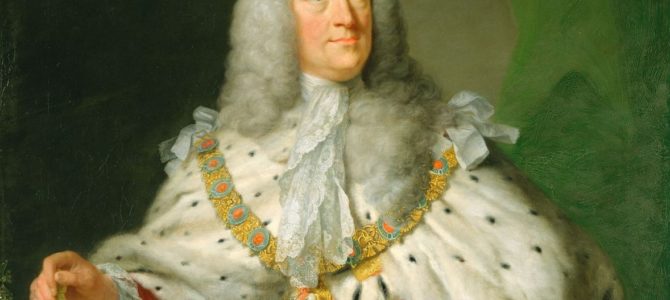
A baby was recently born in England. This is something that happens with a fair amount of frequency and wouldn’t be of much note except that the baby was born to Prince William Arthur Philip Louis, HG, KT, PC ADC(P), duke of Cambridge, presumably a future king of England (and yes, that whole thing is his name). I suppose it’s fine and reasonable for the British people, who for some reason enjoy being ruled, to celebrate the birth of a new person better than them, but for an American it’s unbecoming and should be discouraged.
While the British monarchy is now mainly, though not wholly, a ceremonial link to a grand past and tradition, Americans should always remember that its very existence is antithetical to everything our great nation holds dear. This is part of why our forbears pulled off the greatest military upset since Salamis to stop having a king.
When Thomas Jefferson wrote that all men are created equal and christened our great governmental experiment, he was explicitly forbidding any state from bestowing any power on an individual in light of his or her bloodline.
What to Tell Our Kids
When a new royal baby is born, I often wonder how subjects of the British throne explain the occurrence to their kids while gathered round the telly eating breakfast that for some reason includes tomato and beans. Does one explain that this new royal person is owed a lavish lifestyle at the expense of working people? And if so, does one explain why? And if so, why?
When I teach my son that he is not innately or inherently better than anyone else, that requires also concluding that there also is nobody innately and inherently better than him. I consider this lesson as essential as any I’ll ever teach him. He should never show deference to a human being simply on the basis of whom her parents were, and neither should any American.
When our kids learn their history and the role monarchs played in it, it’s very important that they understand that not having monarchs is philosophically, morally, and culturally an improvement over having monarchs. In America, this is generally what we should teach our kids.
Classic British coming-of-age stories often involve a baby somehow misplaced who, in the fullness of time, is revealed as the aristocrat, or powerful person he was always meant to be. The classic American bildungsroman is the exact opposite. We have Huck Finns and Laura Ingalls Wilders, kids of mean condition who notwithstanding that condition challenge the world they live in and make it better.
Our political stories differ as well. Our greatest president taught himself on a piece of slate, and famously split rail for a living before helming the union in a herculean effort to save it. A century later, Lyndon Johnson admonished an aide who criticized the homemade, shoddy clothing of children while on a tour. Johnson got angry because he grew up wearing homespun, and he wasn’t ashamed of it: he was proud. These stories that are so central to the entire American idea stand in stark contrast to glowing approval of a system where the condition of your birth assures you of power and privilege.
We Are Either Free Or We’re Not
For whatever reason, there are lots of monarchs in Europe. Most of them we pay no attention to. King Phillipe of Belgium is a thing. Presumably he has duties and dinners and some kind of court, or whatever, but who cares? King Felipe VI is king of Spain. I imagine he could walk into your local Wal-Mart and you wouldn’t recognize him, although he might look weird with all his ceremonial dress.
The point is that we have stopped paying attention to these other royal families, and we can do it with the British ones too. When confronted with the concept of royalty, the correct response from an American is to roll our eyes and laugh. Truly, nothing else will do lest we betray our true nature in an attempt to share a tradition that deserves the dust heap.
This attitude, that by right of birth any person may claim, even symbolically, to rule deserves ridicule and may well provide a basis for government actions that Americans must deplore. In today’s United Kingdom, people are arrested for making jokes on social media. Far more seriously, children like Alfie Evans are denied life-saving treatment because Brits think the government knows best.
We Americans should abhor these actions by the British government because they are terrifying. But we should also understand that they are a direct result of a concept of government that does not bestow ultimate power to the individual. Any man with a king or queen must beg his government. As Americans, we control ours.
Celebrities Are Better
If one peruses a Life magazine from the 1950s he will see the last few pages dedicated to high society — the Astors, and Rockefellers and debutante balls. This was America’s answer to aristocracy. But we have thankfully essentially rid ourselves of it. If the social register still exists, it is only for old ladies on the Upper East Side trying to hold on to its dying relevance.
Instead, today we follow celebrities. Jay Z and Beyonce are our focus, and it’s a much better situation. Even people like the Kardashians or Paris Hilton, who were made relevant by sex tapes, is a better option. A sex tape takes more effort than simply being born to royalty. For example, lighting is an issue. Celebrities can sing or dance or be pretty or something. What does royalty do? Head charities where other people do all the work? Ride around in carriages? I honestly don’t know.
I wish all the best to Prince William and Catherine, duchess of Cambridge. God bless. I hope the kid sleeps well and doesn’t keep them up all night. But in the United States, I suggest we ignore all of this. Let the British have their bizarre desire to stratify. But when the next royal wedding happens, turn off the coverage and watch a baseball game, or maybe a little C-SPAN. We’ll all be better off for it.









